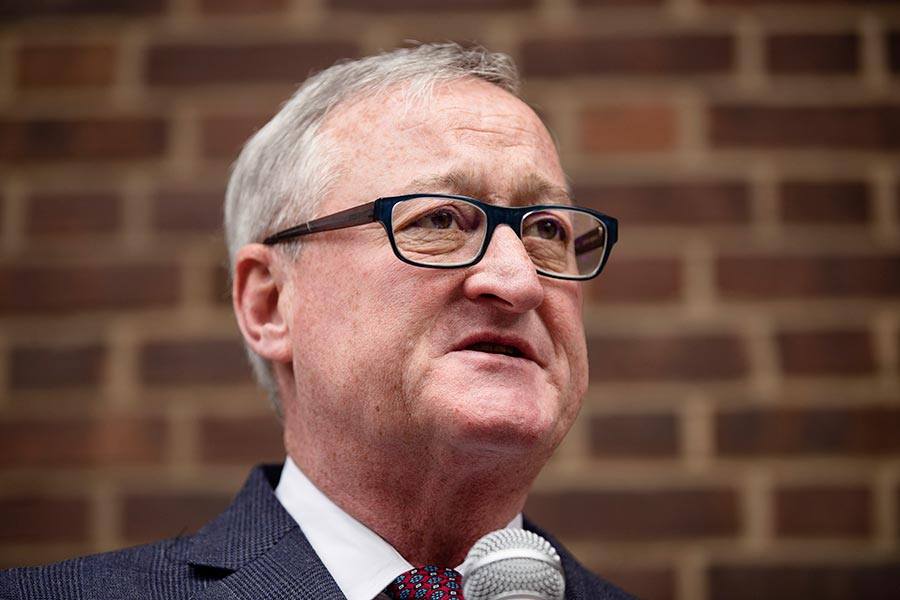Looking Back: Reflecting on Jim Kenney’s First Term as Mayor
As we move toward a new year and the mayor heads into his second term, we consider some of the biggest achievements — and challenges — of his first.

Philadelphia Mayor Jim Kenney (Photo by Matt Rourke/AP)
After beating Republican challenger Billy Ciancaglini in the general election last month, Mayor Jim Kenney is set to begin his second term in January. But before we look ahead, like Kenney himself we are reflecting on his first four years in office. Below are some of his biggest accomplishments and challenges thus far — and a few thoughts on what to expect in 2020 and beyond.
Accomplishments
The Beverage Tax
Whether or not you favor the beverage tax (chances are some of you are yelling at your screens right now), Kenney was able to rally City Council around the levy in 2016 despite fierce anti-tax lobbying efforts on behalf of the soda industry, and it’s largely been seen as his signature accomplishment.
The Kenney administration estimates that by the end of the fiscal year, the beverage tax will have brought in nearly $270 million. Since its inception, the administration claims, the tax has made it possible for 6,000 three- and four-year-old children to receive pre-K, created 17 community schools, and facilitated construction and repair work at 60 parks, recreation centers, playgrounds, and libraries through Rebuild. Which brings us to …
Pre-K and Community Schools
With the passage of the beverage tax came PHLpreK, a program that allows the city to partner with neighborhood-based pre-K programs to enroll preschoolers at no cost to families. The program now serves 3,300 students at 138 sites across the city, prioritizing funding for programs in neighborhoods with high rates of childhood poverty and other early childhood risk factors. It’s expected to expand to 5,500 students per year by 2023. In addition, the Kenney administration’s Community Schools program, which launched in 2016, serves 9,745 students, according to the administration.
Abolishing the School Reform Commission
Under Kenney’s watch, the city dissolved the state-run, wildly unpopular SRC and returned the Philadelphia School District to local control. The mayor appointed nine Philadelphians to the newly created School Board in April 2018, which was seen as a major win for parents, community members, educators, and officials who viewed the SRC as a failed experiment to reel in state funding.
Challenges
The Beverage Tax
Passing the tax and enduring the ensuing court cases were difficult enough — but the verdict also still seems to be out on whether the tax was a good overall move for the city. Sure, much of the pushback comes from the beverage industry itself (and the fact that retailers often pass on the tax to shoppers). But a study published this month by researchers at Washington University in St. Louis, UCLA, and Northwestern University found that the tax led to a 34 percent price increase for soda in Philly, while soda sales have dropped by 46 percent. They also noted that while the net reduction in sugary drinks consumption is 22 percent, as many people leave Philly to buy soda elsewhere, making the tax’s health impact “mediocre at best.”
Gun Violence
During the primary election earlier this year, opponents bashed Kenney for Philly’s rising homicide rate and the city’s failure to curb gun violence. Many say we’ve yet to see substantial results from the administration’s five-year anti-gun violence plan, The Philadelphia Roadmap to Safer Communities. Reflecting on Kenney’s first term this winter, the administration said it is clear “that four years into this journey we must continue to address new challenges and opportunities.”
“At the forefront of our work will be the urgent need to address gun violence and a rising homicide rate, which cause deep trauma and grief in our communities that reverberates across our city,” Kenney’s first-term reflection report read. “Violence prevention, gun control, and improved community policing will be our top priorities.”
The Opioid Epidemic
More than 1,200 people died of overdoses in Philadelphia in 2017 — almost twice the number from three years prior. Overdose deaths decreased slightly in 2018, but many feel the administration isn’t doing enough to counter deaths, particularly in Kensington, which continues to be seen as an epicenter for the national overdose crisis. The administration has shut down drug encampments and ramped up outreach programs, but it hasn’t accomplished all it’s sought to, and many get the impression that the crisis is only worsening. Which brings us to what could come next for Kenney …
What’s Next
To curb the overdose epidemic, Kenney’s administration has supported the launch of a controversial, nonprofit-run safe-injection site. (Philly would be the first major U.S. city to house one openly.) Despite fierce federal opposition (and some local opposition), the issue could very well take center stage in Kenney’s second term.
What else to expect? The administration says it plans to “elevate” the issues of education costs, the student debt crisis, and the need for a talented workforce in Philly by supporting the Community College of Philadelphia “to better prepare and graduate our students.” (Maybe then the city will get a second shot at securing some sort of Amazon HQ2 equivalent.)
Plus, the city will likely press forward on its ambitious anti-climate change goals as the global crisis becomes more pressing.
And the administration said it aims to deliver “more affordable housing, home ownership, and rental assistance to stabilize neighborhoods.” We’ll likely see how the effects of another major development this year — tax abatement reform — play into this goal.


